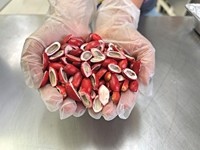Advertisement
Grab your lab coat. Let's get started
Welcome!
Welcome!
Create an account below to get 6 C&EN articles per month, receive newsletters and more - all free.
It seems this is your first time logging in online. Please enter the following information to continue.
As an ACS member you automatically get access to this site. All we need is few more details to create your reading experience.
Not you? Sign in with a different account.
Not you? Sign in with a different account.
ERROR 1
ERROR 1
ERROR 2
ERROR 2
ERROR 2
ERROR 2
ERROR 2
Password and Confirm password must match.
If you have an ACS member number, please enter it here so we can link this account to your membership. (optional)
ERROR 2
ACS values your privacy. By submitting your information, you are gaining access to C&EN and subscribing to our weekly newsletter. We use the information you provide to make your reading experience better, and we will never sell your data to third party members.
Synthesis
Making Cashews Less Allergenic
ACS Meeting News: Sulfite treatment reduces binding of antibody to allergenic proteins from cashews
by Celia Henry Arnaud
August 12, 2014
Tree nuts such as cashews can be dangerous to the many people who are allergic to them. Improved processing methods might help reduce the allergenicity of cashews, according to research presented yesterday in the Division of Agricultural and Food Chemistry at the American Chemical Society national meeting in San Francisco.
The main allergens in cashews are proteins called Ana o 1, Ana o 2, and Ana o 3. Previous work has shown that some of these allergenic proteins are sensitive to strong reducing agents.
Now, Christopher P. Mattison and coworkers show that when two of these allergenic proteins are treated with the mild reducing agent sodium sulfite, the antibodies that trigger the allergic reaction are less likely to recognize them. Sodium sulfite is approved for use in food processing and is “generally recognized as safe” by the Food & Drug Administration. The researchers treated aqueous extracts of ground raw and roasted cashews with 50 mM sodium sulfite at temperatures ranging from 0 °C to 100 °C (J. Agric. Food Chem. 2014, DOI: 10.1021/jf501117p).
The researchers tested the treated extracts on serum samples from people who are allergic to cashews. They observed a reduction in antibody binding to Ana o 2 and Ana o 3 in treated extracts. They saw the largest effect with the extract that had been heated the most.
“The sulfite is thought to reduce disulfide bonds in allergens and alter their structure,” Mattison, a researcher at the U.S. Department of Agriculture’s Agricultural Research Service in New Orleans, told C&EN. “Some of the cashew allergens are dependent upon disulfide bonds for proper folding, and sulfite acts to disrupt this connection. This makes it harder for them to be seen by IgE, the type of antibody that causes the reaction.”
Being able to use an approved agent such as sodium sulfite to reduce allergenicity “has significant appeal,” said Kenneth H. Roux, a biology professor at Florida State University who studies food allergens. However, he noted, the sulfite concentration used to treat the aqueous extract was relatively high; still higher concentrations would probably be needed “to treat more complex foods” such as whole nuts, he suggested. “Even if successful, sulfite treatment could significantly alter or negatively affect food quality.”
Mattison and coworkers already have under way further studies with whole cashews. “We will also need to assess safety, nutritional, and sensory aspects of the treated nuts,” he said. “The goal is to process nuts so that they are unable to cause allergic reactions, but if we can reduce or eliminate the number of life-threatening severe reactions, that would be a great step forward.”






Join the conversation
Contact the reporter
Submit a Letter to the Editor for publication
Engage with us on Twitter